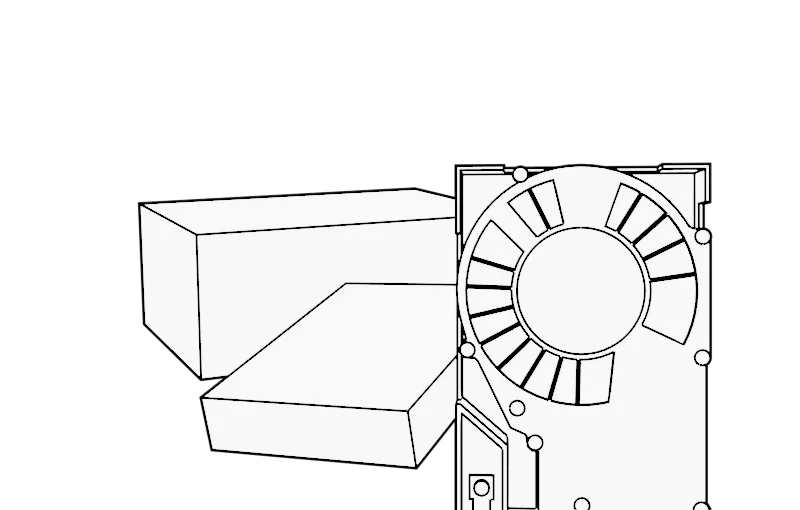Drive Addressing and Interface Termination
_____________________________ ________
_| J1 | | J3 |
| |____________________________|___|________| Connectors
| ........ ... .. ........ | ==========
| RN1 W W W RN2 | J1 - 50 Pin Ribbon Cable
| 2 1 3 | J3 - 4 Pin Power Cable
| | J7 - External LED Light
| |
| | Resistors
| ... .... | =========
| : : : : : : : | | | RN[1-2] - Terminators (x2)
| I I I P S S S W10 | |
| D D D a C p p W11 | Jumpers
| 0 1 2 r S i i | =======
| i I n n | ID[0-2] - SCSI ID
| t - 0 1 | Parity - Parity Enable/Disable
| y 1 | SCSI-1/2 - Write Protect
| J7 / | Spin0 - Spindle Control
| || 2 | Spin1 - Spindle Delay
| : W4 | W1/W2 - Termination Power
| | W3 - +5V to Bus
| ID0 1 2 | W4 - Bezel LED Option
|________:_:_:______________________________| W10 - Slave Sync Term.
W11 - Master Sync Term.
ID0, ID1, ID2 SCSI Address Jumpers
The SCSI ID (drive address) jumpers are identified as ID0, ID1,
and ID2. ID selection is binary, as shown in the table below.
| SCSI |
Jumpers |
| Address |
ID2 |
ID1 |
ID0 |
| 0 |
out |
out |
out |
| 1 |
out |
out |
in |
| 2 |
out |
in |
out |
| 3 |
out |
in |
in |
| 4 |
in |
out |
out |
| 5 |
in |
out |
in |
| 6 |
in |
in |
out |
| 7 |
in |
in |
in |
For multiple drive installations, on one Host Adapter, each drive
must have a unique address. Drives are configured as SCSI ID 7
at the factory.
RN1, RN2, (RN3) Interface Terminator
The Interface Terminator factory installed at RN1, RN2, and RN3
provides proper termination for the interface lines. When
daisy-chaining multiple drives, leave the terminators installed
only in the last physical drive (or drives) on the daisy chain
cable; remove all three terminators from each of the other drives
(or the host computer). Note that there is no RN3 jumper on the
revision 2 board.
Bus Termination Power Option
A jumper is installed at W1, at W2, or at W2 and W3 to select the
source of terminator power (+5V) for the SCSI Bus terminator packs on
the device electronics board.
When a jumper is installed at W1 (the factory default configuration),
the drive provides terminator power to it's on-board terminators.
When a jumper is installed at W2 , terminator power is is provided by
the host system via the interface cable J1, pin 26 (TERMPWR).
When a jumper is installed at both W2 and W3, the drive provides
terminator power to its on-board terminators and also to the SCSI bus
via interface cable J1,pin 26(TERMPWR).
Spindle Control Option
A jumper at SPIN0 is used to select the spindle control option.
NOTE: Do NOT install jumpers at both SPIN0 and SPIN1.
When a jumper is installed, the drive must wait for an interface
START UNIT command to start the spindle motor.
When a jumper is NOT installed, (the factory default configuration),
the drive automatically starts the spindle motor at power-on.
Spindle Delay Option
A jumper at SPIN1 is used to select the spindle delay option
(spindle start-up is delayed based upon the SCSI ID). Delay time
per ID is 12 seconds.
NOTE: Do NOT install jumpers at both SPIN0 and SPIN1.
When a jumper is installed, spindle delay is enabled.
When a jumper is NOT installed, (the factory default configuration),
spindle delay is disabled.
Bus Parity Option
A jumper at PARITY is used to select parity check option.
When a jumper is installed (the factory default configuration), the drive
generates but does not detect parity.
When a jumper is not installed, the drive generates parity and enables
parity detection.
SCSI-1/2 Select
A jumper at WP selects SCSI-1 or SCSI-2. If the jumper is installed (the
factory default configuration), the drive is configured as a SCSI-2 device.
the drive is not write protected.
LED Option Selection
A jumper at W4 is used to select the front bezel LED option
When a jumper is installed (the factory default configuration),
the front bezel LED is enabled.
When a jumper is not installed, the front bezel LED is disabled.
Spindle Synchronization Option
Jumpers installed at W10 and W11 provide termination for the Spindle
Synchronization signals (Slave Sync and Master Sync respectively).
When Spindle Synchronization is to be implemented, jumpers W10 and W11
are removed from all drives except the last drive on the cable.
The Rotational Position Locking field (MODE SELECT command, Page Code
04h) is used to specify spindle synchronization operation; see
document #110366(Scsi Implementation in Micropolis "MZR" Products) and
ANSI-2 SCSI Standard.
Unsynchronized: If the drive is set to Unsynchronized (PRL=00b), it
ignores the SLAVE SYNC signal.
Slave: If the drive is set to Slave (RPL=01b), it does not generate the
MASTER SYNC signal or the SLAVE SYNC signal but synchronizes its
index to the SLAVE SYNC signal (J2,pin 20) supplied by an external
source.
Master: If the drive is set to MASTER (RPL=10b), it generates the SLAVE
SYNC output signal (j2,pin 20) for use directly by the slave drives.
Master Control: If the drive is set to Master Control (RPL=11b), it
generates the MASTER SYNC signal(j2,pin 20). This output
is used by the controller to generate the SLAVE SYNC
signal(J2,pin 20) for the slave drives.
|
